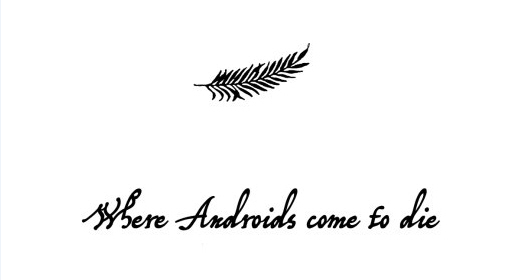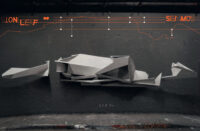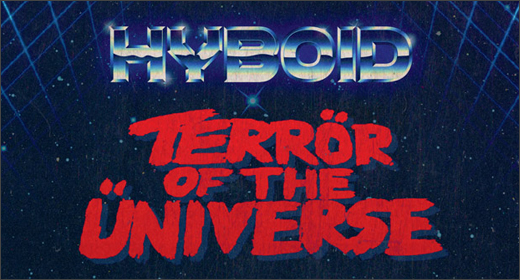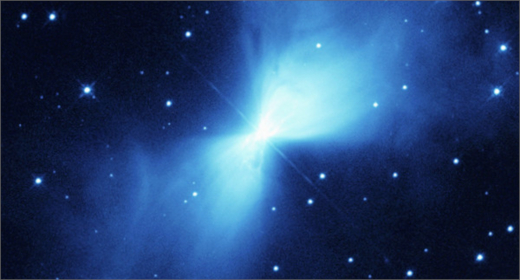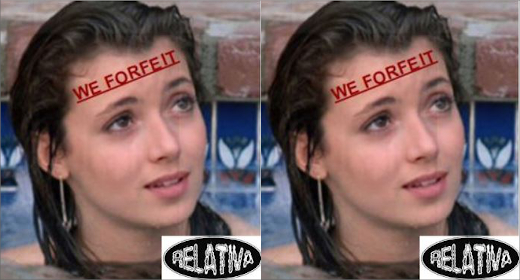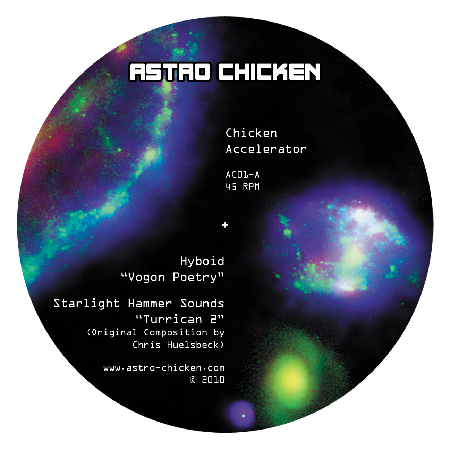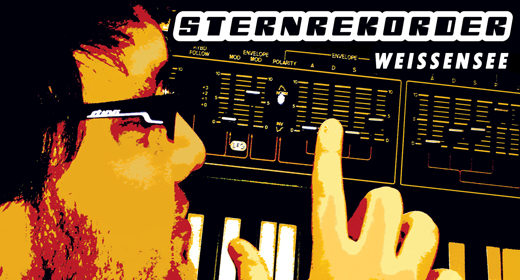The references that Astro Chicken pile into almost every release ensure that the majority of their output is most appreciated by those of a certain age and/or love of bedroom gaming nostalgia, and though Where Androids Come to Die has more serious overtones, the signature aesthetic is still there.
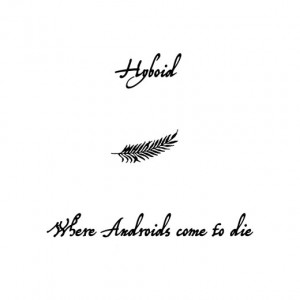
The latest release on the German Astro Chicken label is the ominously titled Where Androids Come to Die from label owner Sebastian Hubert. Quite possibly the last release on the label for some time if the accompanying blurb is true, the fateful tone and “funeral invitation card” sleeve of this latest entry couldn’t contrast more sharply with the rocket-fuelled, sightseeing jaunt around the galaxy and ingenious “alien slime” packaging of Hyboid’s debut, Aliens Ate My Synthesizer, let alone the upbeat cheer of Sternrekorder’s offering in the same year. There were hints of Hyboid’s darker side in “Vogon Poetry,” included on the Chicken Accelerator compilation, the black humour of Douglas Adam’s “Hitch Hiker’s Guide to the Galaxy” informing an infectious melody and propulsive, irrepressible forward motion.
The catchy melodies, quirky programming and penchant for retro sci-tropes are still here, but the pace is frequently slower, the movement more guarded and the mood mournful. Something bad clearly happens during the “Encounter at Vorticon 6” that warrants the hazardous, gritty buzz, chime and eventual chaotic squeals and shrieks. This is followed by the croak, gulp, visceral fx and synth-work of “Space Haze,” reminiscent of the implied gore of Amiga game classic Blood Money and one of the EP’s most unsettling moments. As if things weren’t dark enough already, the first of two promotional stop-motion plasticine animation videos accompanies this track (available to view on YouTube) featuring an unfeeling, ivory-masked alien god playing god with the the human race. It creates, torments and then destroys as, disgusted by their bizarre rituals and uncontrollable vices, it crushes them under its giant palm, before raising apocalyptic storms and earthquakes that ultimately consume them.
An even more disturbing video has been created for the viciously spiky, astral anemone that is “Crush“: a disembodied head in a tiny, bare room lit by a single pendulum bulb is progressively invaded (often quite graphically) by more and more body-parts that attach themselves to it, until an entire human form is created, crushed inside the tiny space like a sardine, barely able to move. Though both “Space Haze” and “Crush” immediately come across as dark and slightly sinister they aren’t especially creepy or disturbing. After viewing the two animated shorts they can never be heard in quite the same way again. Shivers up the spine are guaranteed every time.
A brief respite from the darkness is afforded by prettier tracks like the airy vocal pads, uptempo rhythms and disco pops of “23rd Century Nosferatu” or the bouncy, “Mars Attacks” wibble of “Saucerian” but the pomp and ceremony soon returns. The final funeral march takes place during the “Requiem for Hyboid,” preceded by a robotic eulogy and accompanied by a choir of bass vocals and a vast digital cathedral organ lamenting the passing of the Astro Chicken.
Yet again when listening to these retro releases one is reminded of Amiga-era Octamed music tracks often heard in hyper-atmospheric games like “Universe,” “Turrican 2,” or even “Pinball Dreams/Fantasies” and the like. The references that Astro Chicken pile into almost every release ensure that the majority of their output is most appreciated by those of a certain age and/or love of bedroom gaming nostalgia, and though Where Androids Come to Die has more serious overtones, the signature aesthetic is still there.
Where Androids Come to Die is available on Astro Chicken. Buy at Astro Chicken, Clone or Juno.






